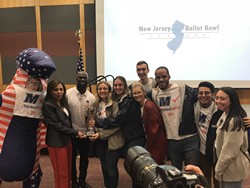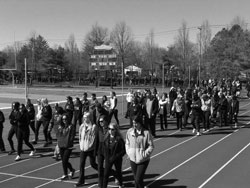The University’s Applied Behavior Analysis (ABA) program was chosen to be among the top 62 in the nation, picked from a pool of 200 candidates, and is the only school in New Jersey to receive this honor.
The rankings were conducted by AppliedBehaviorAnalysisEdu.org, an online publishing group that acts as a “dedicated resource on state licensing, education options, earning potential, practice domains”.
To be considered, programs needed to be held entirely online, fall within specific tuition brackets, and hold institutional accreditation through a Department of Education-recognized agency.
The program, led by Stacy Lauderdale, Ph.D., Department Chair and assistant professor in the Department of Special Education, and Mary Haspel, an instructor in the same department, has only been recently added to the Monmouth curriculum.
It is entirely online, and is designed to meet the course work requirements to sit for the Board Certification in Behavior Analysis (BCBA) exam.
Approved by the Behavior Analyst Certification Board (BACB), the accrediting program for the program, those enrolled in the program will take six courses, with titles such as ‘Applications of Applied Behavior Analysis Principles,’ ‘Research and Advanced Topics in Autism and ABA,’ and ‘Ethics and Professionalism For Behavioral Analysis.’
“BCBA’s usually work with individuals on skill acquisition of behavior reduction, usually in terms of working with children with autism,” said Lauderdale.
Lauderdale was the driving force behind the creation of the program, going through the certification requirements to offer the six-course sequences. Haspel then became involved in creating the content involved with the courses.
The courses are required to have specific content and follow a certain task list, overseen by the board, and guarantees that all professionals in the field have the same set of skills, according to Lauderdale.
“We’re both board-certified behavior analysts, and we have spent our lives and careers working with children with autism and their families, that’s our focus, and so we’re really invested in that,” said Lauderdale. “We think it is a really needed and rewarding profession, and we wanted to give the opportunity to students here to have that.”
In addition to the class requirements, students looking to become certified need to do 1,500 hours of fieldwork, including 75 hours of directly supervised work with a BCBA supervisor, to be able to sit for the BCBA-certifying exam.
“It’s very intensive,” said Haspel. “The six classes are the very beginning of it.”
The program is open to both graduate and undergraduate students, though undergraduate students need to be cleared by their academic advisor to do so, according to Lauderdale. Those earning a master’s degree at Monmouth University can also take the courses in addition to their standard course load.
“One thing that is very unique about the Monmouth program is that our program is housed within the school of education,” said Haspel. “I think that Monmouth was one of the first in the state of New Jersey to offer it within the school of education, and alongside graduate programs in special education, as opposed to psychology.”
According to Haspel, in many other schools these courses had been listed as psychology courses, meaning that those teaching the courses, as well as the students, were usually more versed in psychology, rather than special education.
“We’ve tried to dovetail it, to make it as applicable for teachers as possible,” said Haspel.
They believe that the program was also recognized because it is “100 percent online, and is cost-effective compared to other programs,” according to Lauderdale, and because the programs within the school of education are accredited through multiple bodies.
“The feedback that we’ve gotten from either people who are transferring into the programs or are our own students has been that the content and preparation are very thorough,” said Haspel.
“We give students an opportunity to take a mock exam before they leave our courses, they have extensive practice in all the skills that they need going into the field, taught in the content of the classes, so I think that those are critical features,” she continued.
Lauderdale also commented that the program highlighted “very practical knowledge that [students] can take directly into the schools where they are working.”
“The curriculum in the program is the most current curriculum available in the area, what we call the ‘best practice,’” said Mary Brennan, Chair of the Special Education Department and specialist professor. “It’s demonstrated to be effective, efficient, and yields positive results.”
While she is not directly involved with the program, Brennan is the chair of the department it operates within, and as such is “knowledgeable” about it.
“It’s an outstanding faculty that are teaching in that area,” she continued. “They have a wonderful balance of factual information based on research, and practical application based on their own teaching experiences and working with students with autism. That’s the number one reason – their commitment and passion.”
“It’s a very specialized program, but one that is increasing in demand,” said John Henning, Dean of the School of Education. “Just having an ABA program is special in itself, and to have a high quality one is even better.”
Henning also hopes that the ABA program at Monmouth University will continue to grow as they build enrollment in the courses.



